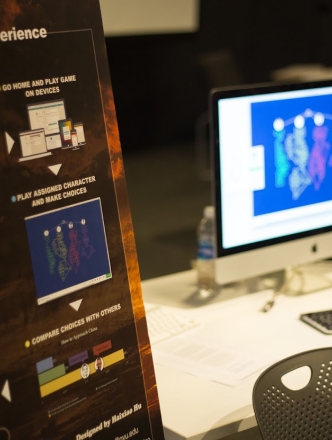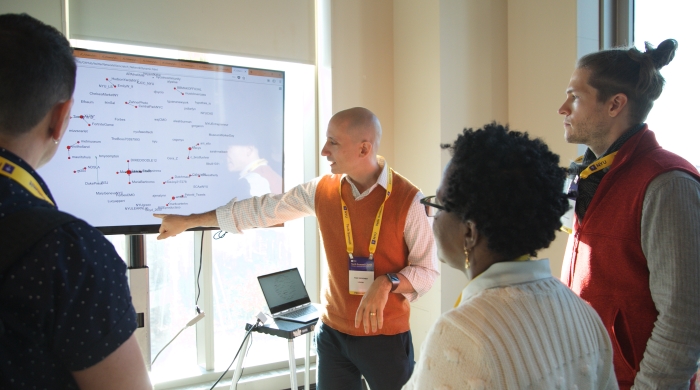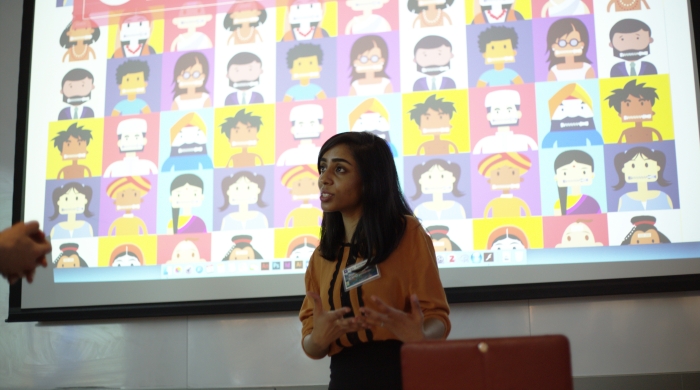
Application Extended: Still Accepting Applications
30-36 Credits Required
The Master of Arts Program in Learning Technology Experience and Design (LTXD) is a 30–36 credit program that prepares students to create, use, and evaluate media and technology for learning, from software and websites, to video and mobile phone applications.
Required Courses
18 Credits
Students take the thesis course twice, in two consecutive semesters (Research in Educational Communication and Technology). Students are advised to complete all other course requirements prior to enrolling in the thesis course for the second time, in order to devote their final, graduating semester exclusively to the thesis.
Electives
12–18 Credits
12 additional units are required to complete the program minimum of 30 units. Students may take up to 6 additional units for a program maximum of 36 units.
The Games for Learning concentration requires 3 of the 4 following courses:
EDCT-GE 2500: Video Games and Play in Education, EDCT-GE 2505: Design Simulations and Games for Learning, EDCT-GE 2510: Narrative, Digital Media and Learning, or EDCT-GE 2520: Research on Simulations and Games for Learning
Specializations
User Experience Design (UXD) Specialization
In this specialization, you’ll immerse yourself in the science and art of creating learning experiences and products that focus on the user. Your studies will be grounded in practices such as human-centered design, instructional design, design thinking, and user research.
Upon completing this specialization, you'll have the skills to:
-
Understand and empathize with users as you address design problems, utilizing a range of user experience (UX) research methods including interviews, observations, usability testing, and participatory design
-
Use a learner-centered and human-centered approach to design, redesign, and constantly improve educational experiences and products
-
Effectively apply UX methods such as sketching, ideation, personas, empathy maps, analysis, and prototyping to develop your products and present your findings to stakeholders
-
Work in and lead teams through collaboration and strong interpersonal relationships
Learning Analytics and Educational Data Science (LADS) Specialization
You'll learn how to design and create information and decision-making tools for educational settings that are based on data science, machine learning, and artificial intelligence.
Upon completing this specialization you will have the skills to:
- Create solutions for educational settings based on your analysis and development of data from learning tools.
- Use data and analytics to better understand current learning processes and outcomes and improve them for the future.
- Meaningfully critique and improve the design of learning analytics from technical, practical, social, and ethical perspectives.
- Effectively communicate how interconnected infrastructure, policy, and societal factors play a role in learning analytics systems.
To complete this specialization, you'll take two required courses in our program and choose one NYU course from a menu of options.
Transformative Learning Design (TLD) Specialization
In this highly relevant specialization, you’ll learn about emerging technologies and innovative learning activities and approaches. You will build on emerging trends afforded by new media and technologies (AR/VR, AI, social media, etc) and the latest findings in learning sciences and learning experience design to design engaging online experiences for K–12, higher education, and adult learning environments, both in formal and informal settings.
Upon completing this specialization, you'll have the skills to:
- Move beyond traditional learning activities and technologies to create engaging, motivating learning environments
- Develop the ideal mix of synchronous and asynchronous learning activities for any situation, drawing on best practices in the field
- Respond effectively to the expectations of today’s learners
- Work with educators from diverse backgrounds and in divergent settings to craft designs that meet unique needs
- Help deliver on the promise of expanded educational opportunities for diverse communities
To complete this specialization, you’ll choose three elective courses from four options. You’ll also have the opportunity to engage in supplemental learning activities including research internships, faculty projects, independent study, events and workshops, and an online learning thesis.
Games for Learning (G4L) Concentration
You'll create, use, and evaluate digital games for use in learning environments, both formal and informal.
Upon completing your concentration, you will have an in-depth knowledge of:
- The ways social, emotional, cultural, and cognitive aspects of learning affect game design.
- Game design models and developmental practices.
- The value of narrative in game design, and how to develop it effectively.
- How to produce research that can improve and evaluate the design of games for learning.
You'll also gain the skills to:
- Discuss the role and function of play in games for learning, as well as how diverse features of games contribute to games for learning, such as role playing, immersion, narrative, feedback, consequences of failure, and more.
- Explain the potential values and limitations of the use of digital games for learning, including what types of learners and subjects benefit from them and in what settings games have the potential to support learning.
Additional Information
The thesis capstone is a culminating project for which you are expected to integrate and apply what you have learned through previous academic work and field experiences, with faculty supervision.
Thesis capstone projects include the design and development of technology-based learning environments, scholarly critical inquiry papers, and small-scale research projects.
You will develop your thesis capstone projects in a two-semester consecutive course sequence. Thesis capstone students meet in class as a group weekly, reporting on the progress of their projects, discussing their research, and screening prototype media for peer and faculty critique. At the conclusion of the semester, students present their thesis capstone projects to the program community at the ECT Design Expo, a thesis capstone showcase event.
Of the 36 credits required for the Master of Arts degree, students are required to take 24 credits in residency, defined as courses taken at NYU.
On recommendation of the adviser, credit for graduate coursework completed at an accredited graduate institution, not applied to another degree, and not more than 10 years old, may be granted to a maximum of 30% of the 36-credit requirement if a grade of "B" or better was earned for any such coursework.
Master of Arts students must maintain a minimum 3.0 grade point average in DMDL courses and in their overall academic record.
Tenure of Matriculation
The Steinhardt School requires students to complete requirements for the Master of Arts degree within six (6) years of matriculation, defined as the first semester of enrollment for courses leading to the degree. The clock stops only during official leaves of absence. This applies to both full-time and to part-time students. Regardless of matriculation, the validity of courses towards a degree expire after 10 years.
From the Steinhardt Graduate Bulletin: "A candidate has a six-year period following the date of matriculation for the completion of all requirements. If continuous matriculation has not been maintained, a reevaluation of credentials is necessary, and only those courses completed within the last 10-year period will be credited."
Maintenance of Matriculation
From the Steinhardt Graduate Bulletin: "To maintain matriculation, a candidate must complete at least 3 units on the second (2) level or above at New York University, under the auspices of the Steinhardt School of Culture, Education, and Human Development, each academic year (fall and spring) or, in lieu of such completion, must pay a maintenance fee..., plus the nonreturnable registration and services fees each term."
Students must maintain "active status" throughout their studies, beginning with the first semester of matriculation and including the semester in which they intend to graduate. To do so, Master of Arts students must complete at least three (3) credits at the 2000-level (or higher) each fall and spring semester (not summer). If students can not enroll in course work in a given fall or spring semester, they must register for Maintaining Matriculation (MAINT-GE 4747), for which they pay a non-credit–bearing maintenance of matriculation fee.
Registration for Maintaining Matriculation entitles students to use the libraries and other facilities, consult members of the faculty, participate in University activities, and use student health services and the Coles Sports Center. This option may be used during the semester in which students intend to graduate, if they are completing incomplete course work but taking no additional course work. Students may register for MAINT-GE 4747 only after they have been enrolled during one academic year for a minimum of three (3) credits and with permission of a faculty adviser. Students may register for MAINT-GE 4747 for up to a total of two (2) years within the six-year period allowed to complete the degree.
Students should select their classes in conjunction with their academic adviser. Please meet with your adviser to discuss courses, and once your adviser has approved your selections, you can sign up for courses online in Albert. After the department enters your adviser clearance (typically within 1-2 business days), you can sign up for courses online in Albert.
There is a guide to planning your courses available.
Take the Next Step
Advance your personal and professional journey – apply to join our community of students.
Apply Now


